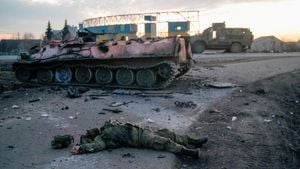JERUSALEM — The troubling saga surrounding the deaths of six Israeli hostages held by Hamas has taken another turn, fueling simmering tensions within Israel. According to recent reports from the Israeli military, the hostages were likely executed by their captors shortly before or during the strikes on February 14, 2024, as Israeli forces bombed positions near Gaza. This development has reignited debates about the risks of military action and its impact on hostage recovery efforts amid the continuing conflict.
On February 14, the Israeli Air Force conducted airstrikes aimed at Hamas command centers located within the Gaza Strip. These locations not only served as operational bases for Hamas fighters but also as sites where hostages were reportedly being held. Following these airstrikes, the bodies of the hostages were eventually recovered in the southern Gaza city of Khan Younis on August 20, 2024. Autopsies revealed gunshot wounds, leading military investigators to conclude the hostages had been shot dead, likely by their captors.
The six hostages, identified as Avraham Munder, 79; Haim Peri, 80; Yoram Metzger, 80; and Alexander Dancyg, 75, from the kibbutz Nir Oz, alongside Nadav Popplewell, 51; and Yagev Buchshtab, 35, from the nearby community of Nirim, were among over 250 people abducted during the initial Hamas-led attack on October 7, 2023. That day marked the start of the current Gaza conflict, resulting in the deaths of approximately 1,200 individuals, many of whom were civilians.
The investigation revealed the Israeli military was unaware of the hostages' presence at the sites being targeted. Had there been intelligence indicating their location, the airstrikes would not have been authorized, military officials reported. Because it remains unclear whether the hostages were executed before, during, or immediately after the airstrikes, this uncertainty adds layers of complexity to the already dire situation.
Previous reports highlight how some hostages had been held under horrific conditions, isolated for long periods. Families of the missing individuals expressed distress, fearing for their loved ones' lives as time elapsed. With Israeli forces acknowledging they had tightened their operational protocols post-incident, ensuring hostages were accounted for prior to any military action, the question looms: have the new measures done enough to prevent future tragedies?
Families of the victims have spoken out, highlighting their desperate circumstances. The Hostages and Missing Families Forum, which advocates for the release of hostages, emphasized the urgent need for negotiations, stating, “Time is of the essence – many of the hostages are still alive and enduring impossible conditions of abuse, starvation, and isolation.”
This incident has also heightened scrutiny surrounding the Israeli government's military strategy, leading to discussions among Israeli leaders about the potential consequences of military operations on hostage recovery missions. Critics within Israel posited concerns about the effectiveness of strategies deemed necessary to counter Hamas, arguing they might also exacerbate the dangers facing those still held captive.
During the airstrike, reports indicated Hamas fighters were killed, allegedly due to suffocation from the blast-generated byproduct. This raised additional questions about the extent of collateral damage from airstrikes, particularly concerning the hostages who were caught in the crossfire. The scale of destruction caused by the warring factions has been severe, with Gaza health officials estimating over 44,500 fatalities from the conflict, without distinguishing between militants and civilians.
Current Israeli Prime Minister Benjamin Netanyahu remains steadfast on military pressure against Hamas, asserting the need to dismantle military infrastructure and operational capabilities. Nevertheless, skepticism exists about whether such military approaches will yield the desired outcomes, especially concerning the safe return of hostages. This conflict amplifies unrest within Israel, stirring emotional and political ramifications.
Branding these events as merely part of the broader strategy may minimize the human cost involved. Families of hostages are left grappling with their loss and trauma, their voices often lost amid political smoke and military rhetoric. They now await clearer answers as the investigation continues and the search for remaining hostages becomes increasingly urgent.
One member of the family shared their anguish about the brutal nature of the situation, reflecting on the impact of such prolonged conflict on human lives. With each passing day, uncertainty looms larger, as each mother, father, and family member haunts themselves with the question: when will they return?
Meanwhile, international observers and organizations have voiced concerns about the humanitarian crisis arising from the conflict. Calls for ceasefires and negotiations have fallen on deaf ears amid entrenched positions from both parties involved, with Hamas demanding the halting of military operations as part of any agreement, leaving hostages' families caught between diplomacy and devastation.
While Israel's military strategy against Hamas continues, the uncertainty surrounding the fates of over 100 additional hostages remains palpable, and pressure mounts on Israeli officials to devise more effective means of securing their release without placing them at greater risk.
This investigation serves as both reminder and warning as Israel grapples with its military policies, attempting to navigate the murky waters of hostage negotiations and military necessity. How will this tragedy influence future military strategies, and will the sacrifices made see any fruits of constructive negotiation? The world watches, waiting with bated breath and heavy hearts.



